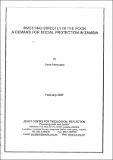| dc.contributor.author | Jesuit centre for theological reflection | |
| dc.date.accessioned | 2023-05-16T10:21:29Z | |
| dc.date.available | 2023-05-16T10:21:29Z | |
| dc.date.issued | 2007-03-02 | |
| dc.identifier.uri | https://hdl.handle.net/20.500.14274/1790 | |
| dc.description | If this narrow growth paradigm is allowed to shape government policies and priorities, then Zambia dangerously risks leaving behind in development the 2/3 of its population (67% poor) who face real, identifiable, daunting but surmountable challenges to break out of situations of poverty. In other words, Zambia is a country in need of pro-poor growth, growth that is inclusive, equitable, just and transforming, growth resulting from the productive efforts of each and every. Zambian person, including the poor, the vulnerable, the destitute, the low capacity, the HIV positive, the disabled, other marginalized groups and each and every member of society. | en |
| dc.description.abstract | In terms of macro-economic indicators, Zambia appears like a country that is positioned to make a break-through in national development: the economy has achieved positive economic growth for many consecutive years, inflation levels have fallen into single digits for the first time since economic liberalization, the staggering international debt of over US$7 Billion has been reduced to just over US$500 million, and yes, -the 2006 Budget Speech by the Minister of Finance and National Planning proposed an impressive total expenditure of 10.2 trillion Kwacha. Linking macro-economic indicators to issues of poverty reduction, economists usually lilt lit their analysis to empirical models predicting that sustained economic growth over 6% or 8% per year will ultimately lead to poverty reduction. This economic thinking almost suggests that "trickle down" poverty reduction is an eventual and automatic result of economic growth, regardless of who participates in this growth and what social policies are in place. | en |
| dc.description.sponsorship | Irish Aid and Joint Country Programme | en |
| dc.language.iso | en | en |
| dc.publisher | Jesuit centre for theological reflection | en |
| dc.rights | Attribution-ShareAlike 3.0 United States | * |
| dc.rights.uri | http://creativecommons.org/licenses/by-sa/3.0/us/ | * |
| dc.subject | Case study | en |
| dc.subject | February 2007 | en |
| dc.subject | Cost of living | en |
| dc.title | February 2007 Case Study: Investing Directly in the Poor: A Demand for Social Protection in Zambia | en |
| dc.type | Case Study | en |

